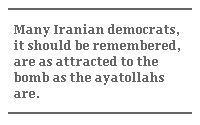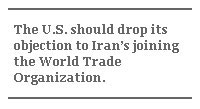Pressure Alone Will Not Deter Iran from Its Nuclear Path
Pressure Alone Will Not Deter Iran from Its Nuclear Path

WASHINGTON: Iran may have slipped up in its secret effort to acquire nuclear weapon capabilities. The International Atomic Energy Agency alleges that Iran failed to follow proper procedures when it imported and perhaps processed uranium from China. The U.S. hopes that the ensuing crisis atmosphere will become unbearable for the Iranian government. Yet crisis and pressure do not a strategy make. If the aim is to persuade Iran to abandon interest in acquiring nuclear weapons, Washington will need a strategy to convince Iranian nationalists that their country will gain security, respect, and a prominent role in post-war politics in the Persian Gulf.
Washington long has suspected that Iran's ostensibly civilian nuclear program really is a cover for bomb making. The recent public discovery of a major uranium-enrichment plant in Natanz has led to allegations that Iran must secretly have done pilot-scale testing of relevant equipment at a different, unknown facility. ( See "Iran's Secret Quest for the Bomb") This would violate technical notification rules under the Nuclear Nonproliferation Treaty. The U.S. is pushing the International Atomic Energy Agency in Vienna to press charges against Iran later this month.
The answer to the Iranian nuclear challenge is in Iraq, not Vienna. The 125,000 troops in Iraq and President Bush's tough-minded leadership have made Iran's leaders nervous enough to look for accommodations with Washington. But the list of American demands is long. The Iranian government worries that even if it begins to meet these demands the Bush Administration will try to overthrow it eventually anyway. So, "why deal?", Iranians ask.

This is where the Iraq answer comes in. Now that the Saddam regime is gone, President Bush should seize the opportunity to convince Iran that it doesn't need nuclear weapons. Iraq was the gravest threat to Iran, followed by the U.S. and Israel. The U.S. helped Iran immensely by removing the Iraq threat and the anti-Iranian Taliban from power in Afghanistan. The administration should convince the Iranians that we can work with them -that Iran will not be a target of Israeli or U.S. military attack if it does not acquire weapons of mass destruction and threaten Israel's existence.
Iranian Defense Minister Ali Shamkhani seemed to recognize this logic in a February 2002 statement: "The existence of nuclear weapons will turn us into a threat to others that could be exploited in a dangerous way to harm our relations with the countries of the region."

Right now the U.S. keeps Iran on the margins of its own region -the Persian Gulf -because Tehran's radicals support some regional terrorist organizations, undermine Israeli-Palestinian dialogue, and seek to acquire nuclear weapons. As a first step, the U.S., Iran, and other Persian Gulf states should be convened in a regional dialogue on the post-war future of the Persian Gulf region. Recognizing Iran's respect for the United Nations and its refusal to kowtow to Washington, the U.S. should quietly encourage Kofi Annan to call for such a dialogue. (The U.S. says it welcomes a UN role in the region; the dialogue suggested here is appropriate). The dialogue should aim to initiate a diplomatic process for devising principles, rules and confidence-building measures to structure security relations among Iraq, Iran, all the smaller regional states, and the U.S.
Still, Iran's fluid nationalist politics are as difficult to handle as nitroglycerine. The U.S. must squeeze Iran (and its suppliers) enough to block Iran's acquisition of nuclear weapon capabilities without shaking so hard that Iranian nationalists explode and say, essentially, "yes, we withdraw from the NPT, and you cannot stop us." Once that happens, Iranian nationalism will attach to the bomb, and the chances of persuading Iranians to give it up will become nil. Many Iranian democrats, it should be remembered, are as attracted to the bomb as the ayatollahs are.
Unfortunately, Washington's policies inflame Iranian nationalism. Nothing fuels nationalism like resistance to public diktat by arrogant, perhaps hypocritical outsiders. As the pre-revolutionary finance minister, Jahangir Amuzegar, noted recently, many Iranians took the "axis of evil" harangue "as a deep insult to their national dignity... Any U.S. strategy that even remotely raises the specter of foreign interference in Iran is doomed to fail."

In other words, Israel's nuclear and chemical weapons have to be brought into the picture, too. Secretary of State Colin Powell recently said, "It has always been a United States goal that conditions could be created in this part of the world where no nation would have a need for any weapons of mass destruction." This is necessarily a fairly long-term project but the US should start begin addressing the issue.
Iranians also need to see that they will gain from ending activities that now isolate them internationally. The hardliners who now control nuclear policy oppose direct negotiations with the U.S. and integration into the global economy. The conservative bazaar interests and rich religious "foundations" don't want economic competition. They largely prevent reformers from engaging with the U.S. A cunning U.S. policy - as opposed to an ineffective but moralistically pure one -would make an offer that no Iranian faction can refuse. Giving hardliners no realistic choice but to do business with the U.S. would unfreeze official relations with Iran and give reformers operating space.
The simplest first step would be for the U.S. to drop its objection to Iran's joining the World Trade Organization. Prospective WTO membership would give progressives a lever to push reforms necessary to satisfy WTO terms and integrate Iran more deeply into the international political economy.

Going further, the U.S. should unilaterally lift economic sanctions that impede development of oil and natural gas flows to Pakistan and India. Iran can be a wellhead source and/or a cost-effective pipeline route to bring natural gas through Pakistan to energy-starved India. The gravest challenge is to overcome Indo-Pak enmity and India's concerns about security of supply transiting through Pakistan. The U.S. could promote vital economic and security objectives in the Indo-Pak relationship by facilitating with Iran the development of a natural gas pipeline from or through Iran to India
Because of the cross-hatched organization of power and authority in Iran, Washington should convey to the head of each important political institution that the U.S. is determined not to be the obstacle to Iran's integration into world civilization. Each of these overtures should be communicated directly to the Supreme Leader Ayatollah Khamene'i, the chairman of the Expediency Council, Rafsanjani, President Khatami, and the speaker of the Majlis. The strategy is to give hardliners an unrefusable opportunity to satisfy the Iranian public's desire for relations with the U.S.
The U.S. and its friends should use every possible means to block nuclear weapon-related supplies coming into Iran. But ultimately the solution to the proliferation problem likes in persuading Iranians - reformers and hardliners alike -that they do not need nuclear weapons and will be better off without them.
1 Oliver Burkeman, The Guardian, Feb. 6, 2002.
2 Jahangir Amuzegar, "Iran's Crumbling Revolution," Foreign Affairs, January/February 2003, p. 46
George Perkovich is vice president for studies at the Carnegie Endowment for International Peace, and author of India’s Nuclear Bomb and other studies on nuclear proliferation in Iran, Pakistan, and India.